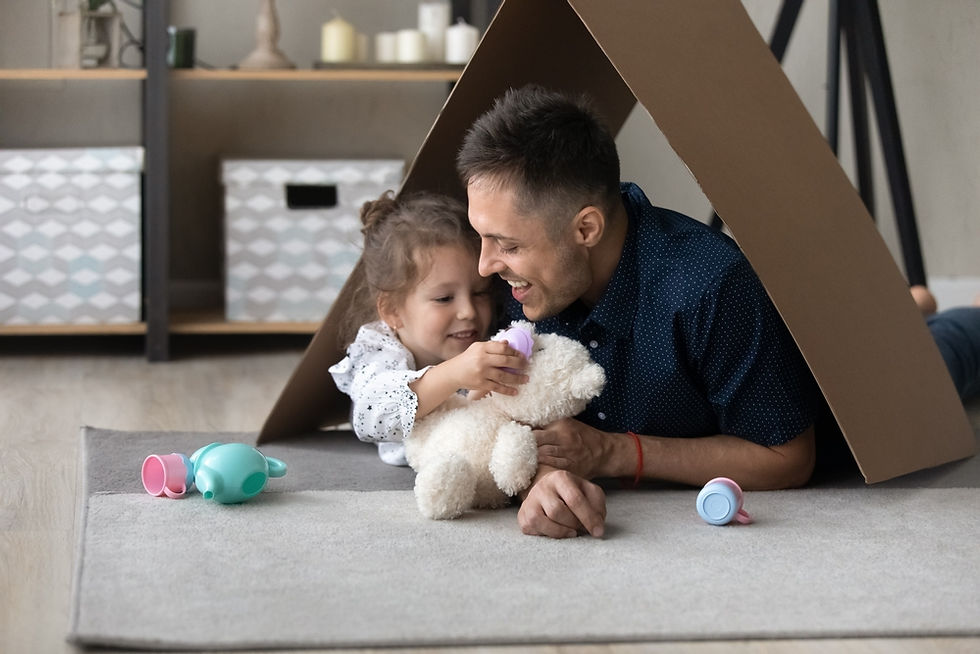Building a Safe Haven at Home: Creating Emotionally Secure Spaces for Your Child
- Jade Bardon
- Jul 23, 2025
- 3 min read
Updated: Jul 24, 2025

In today's fast-paced and often unpredictable world, our children are constantly navigating new experiences, big emotions, and complex social landscapes. As parents, while we instinctively aim to protect them physically, true safety encompasses a profound sense of emotional security – a feeling of being deeply understood, valued, and truly accepted for who they are (Bowlby).
"There is no such thing as a baby, there is a baby and someone." — D.W. Winnicott
As a child & adolescent psychotherapist, my PhD research topic is interested in psychological safety. I've witnessed firsthand how vital these emotionally secure spaces are for a child's thriving in clinical practice. They are less about a specific physical room and more about the consistent atmosphere you cultivate within your home and your relationship with your child.
What is an Emotionally Secure Space?
Think of it as your child's inner "safe haven." It's a place, or more accurately, a pervasive feeling, where:
All feelings are welcome: Children learn that expressing a full range of emotions—even the messy, uncomfortable ones like anger, sadness, or frustration—is healthy and won't lead to rejection.
They feel seen and heard: Their unique thoughts, ideas, and experiences are genuinely acknowledged and respected, which is foundational for building self-worth.
They are loved unconditionally: Their inherent value isn't tied to their behaviour or achievements. This bedrock of acceptance allows them the freedom to explore and experiment without fear of rejection.
They can make mistakes and learn: It's an environment free from harsh judgment, where errors are viewed as invaluable opportunities for growth rather than personal failures.
This type of security is the bedrock for building resilience, confidence, and robust emotional development. It's the core of what I call a "nurture play space" – a setting where authentic growth and healing can truly happen.
Why is This So Important for Your Child?
Creating an emotionally secure space profoundly impacts your child's well-being. This idea is beautifully supported by attachment theory, which shows us that when children have a 'secure base' at home, they gain the confidence to explore the world, knowing they can always return to a safe, supportive connection. It’s how they learn to trust themselves and others.
Emotional Regulation: When children feel safe to express their emotions, they learn how to understand and manage them, discovering that feelings pass and they can cope.
Resilience & Confidence: Knowing they have a secure base empowers them to take healthy risks, face challenges, and bounce back from adversity.
Strong Relationships: It fosters trust and open communication, strengthening the parent-child bond and laying essential groundwork for future healthy relationships.
Healing & Processing: For children who have experienced stress or even trauma, a secure space allows their brains and bodies to relax and process difficult experiences without feeling overwhelmed.
Authentic Self-Expression: Your child learns that their unique voice, ideas, and personality are celebrated, fostering a strong sense of self and individuality.
How to Build Your Child's Safe Haven at Home
Cultivating emotional security is an ongoing journey, not a destination. Here are actionable ways to infuse your home with this vital sense of safety:
Practical steps
Listen Actively & Validate: Show your child their feelings are heard and respected.
Establish Predictable & Consistent Routines: Regular rhythms and your predictable responses provide control, reduce anxiety, and build trust.
Set Loving, Clear Boundaries: Consistent limits offer security, teach self-control, and provide a vital sense of safety.
Embrace Sensory Comfort: Create cosy spaces and be mindful of their sensory needs to enhance comfort.
Prioritise Attuned Play: Even 10 minutes of dedicated play daily significantly builds security and connection, allowing for emotional processing.
Model Emotional Regulation: Your calm presence teaches them how to navigate their own feelings.
Communicate Unconditional Acceptance: Separate challenging behaviour from your child's inherent worth.
The Ripple Effect
By building these emotionally secure spaces at home, you're not just supporting your child; you're strengthening your entire family unit. You're fostering an environment where every member feels understood, valued, and safe to be their authentic self.
If you find yourself navigating particularly challenging emotional landscapes with your child, or if you'd like to explore how a therapeutically-informed approach can further enhance your family's well-being, I'm here to support you.

Jade Bardon


Comments